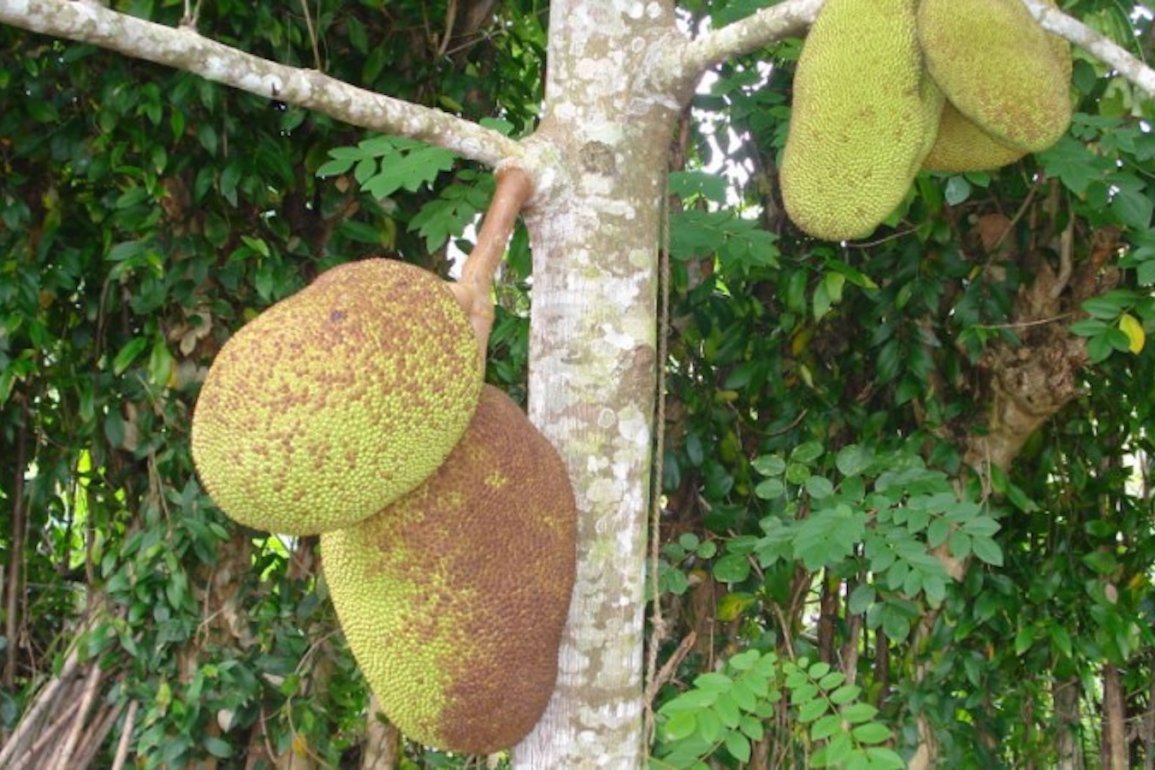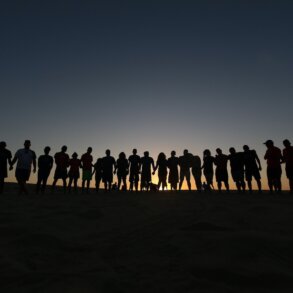By Susan Basterfield and originally published on medium.com in Enspiral Tales
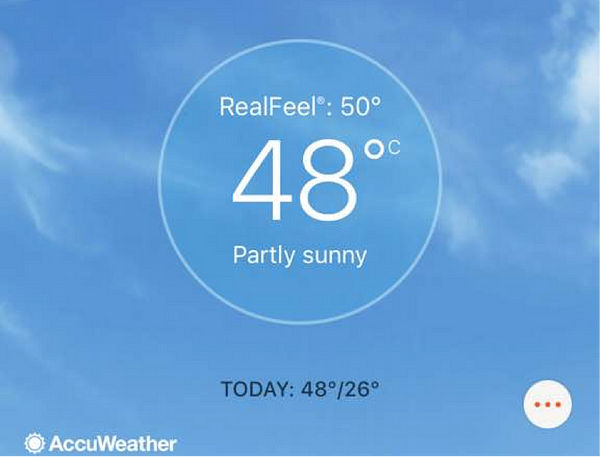
Almost a year ago, I was invited by Ved Krishna to Faizabad, Uttar Pradesh, to experience a remarkable company, connected by values and love, with a vision of bringing a non-hierarchical way of being to the most hierarchical country on earth. Mango Season was reportage of that experience.
I returned in October last year, to facilitate an offsite for the leadership team. This was a time of transition for the organisation, as Ved moved out of the day-to-day operations of Yash Papers to focus on Chuk — creating compostable tableware with the audacious goal of ridding India of styrofoam.
I am very clear for myself in my facilitation practice — although I scaffold the process and choose the tools, the only objective in mind is to surface what needs to come, and design for action. Sometimes the action or movement is internal, and happens solely through the process. Other times it is operational and shifts a practical application. I was curious and a little nervous about how this fully participatory approach would work, considering the cultural context, the new and old leaders, and the language barrier.
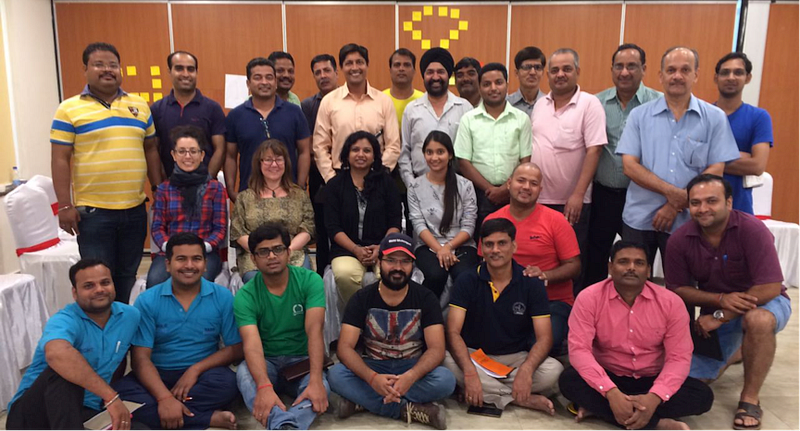
Utilising Liberating Structures and Open Space and Kabaddi, those days both bonded and shifted the sense of possibility in the team. It was also proof of the magic of free participation, safety, trust and ownership of one’s intentions and needs. These practices are not bound by experience or culture — they are universal, intuitively understood, and fundamentally human.
The obvious happened: the ‘consultant’ (me) left, and although the shift had begun, its momentum was muted. By December, Ved and I were trying to sense a way into a more deliberate intention, and imagined a coach and facilitator on the ground, as part of the team, for an extended period. One day I was having lunch with some powerful women, and another, whom I’d not previously met, joined unexpectedly. I simply asked if anyone had any idea of who might resonate with the project, and Lucia Die Gil, (the unexpected guest) said without a flicker of hesitation ‘I do’. And so it was, within 3 months Lucia joined the Yash Papers team.
When I arrived at Mangalam Farm last week, the mangoes were not quite ready. Monsoon had not yet arrived. The pressure and the heat were difficult for me, so I was grateful for a few days of relaxed time to tune in. Lucia had scaffolded a plan and invitations for work with a few teams — the plan changed.
On Sunday morning, Ved cooked breakfast –probably the best omelette I’d ever tasted! Relaxing in the afterglow of delicious food, he shared another vision — one even more bold and audacious than self-management. He said:
‘Let’s create the best fricken workplace in India’
I’ve been around a long time, have known and worked with many great leaders. There are few for whom that statement would be anything more than a throwaway sound byte. And perhaps I am super naïve, but I believe it’s possible.
So we shifted our plans. A new invitation was made:
Transformation occurs through choice, not mandate. Invitation is the call to create an alternative future. What is the invitation we can make to support people to participate and own the relationships, tasks, and process that lead to success? — Peter Block
Having never worked with Lucia as a partner, it became clear in a matter of minutes that we would flourish together, with no stress, complete trust, and in an emergent energy.
Upon arrival in the hotel conference room, we arranged the chairs in a circle. As soon as the group arrived, Manoj said ‘let’s sit on the floor’ and so we did, for the next two days, in circle. These cultural tools of equality — the circle, the check-in, the presencing, are relaxed, not judged. If anything, it’s maybe more so in India — willingness and a practice of letting go, suspending disbelief, and being open to whatever happens.
We began the work with dreaming — in partners — one closes eyes for 5 minutes, and speaks their dream — the best workplace in India whilst the other transcribes — no reaction, no questions. One asked ‘by what measure’? The reply: ‘your measure’. We shared back, and transferred each idea onto a post-it, which were then grouped into themes. In addition to themes, it became clear that there were 3 distinct categories: Tools, Processes and Outcomes.
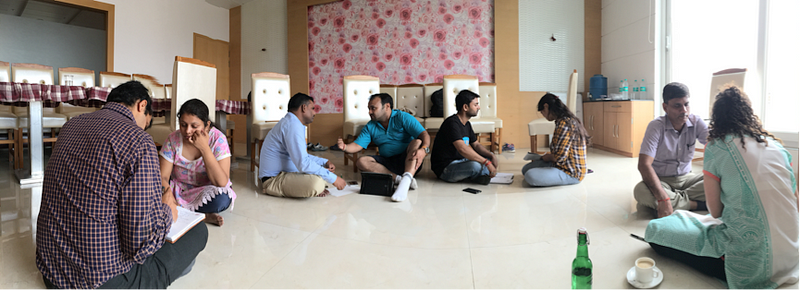
The next invitation was for each person to choose 4 cards that they were most energetically attracted to, then, again in pairs, to propose a minimum of 5 action points around each. In the end, from over 200 ideas, we landed with 48 potential ‘projects’.

At Enspiral, we’ve been experimenting with Working Groups for a while. Enspiral is a collective (a relationship, not a job), and as such we don’t have any paid roles to do the work we need to do on the organisation. The model has worked for us and you can read about our form in the Enspiral Handbook.
Although the inspiration for Working Groups came from our specific need, recently I’ve noticed that the need also exists within conventional organisations, especially those who are intentionally participatory.
Another of the organisations I work with, Avivo in Perth, Western Australia, is 800-person home health care provider on a journey to self-managed local teams. I am documenting that journey in audio format — and they too have commenced 3 prototype working groups.
This was a natural progression — when organisations choose to move from a standard consultation process on transformation to a deliberately participatory one, a key difference is in how the transformation work is done. Like Enspiral, where we are not paid to do this work, in Avivo, and as you will see, at Yash Papers, the work is not a separate job, but a willing act of generosity and service.
My experience is that it is disingenuous to create a participatory process to determine the work, and then hand that work off to a traditional business improvement or project management process. When the individuals identify, scope, and commit to the work, they should also be given the opportunity to do the work.
After scaffolding 48 opportunities (out of almost 200 identified) as essential ingredients to creating #BFWPIN*, we sat in circle and talked about the prospect of working groups. The concept of holding Guardianship of an idea. Who in the group felt called to be the Guardian of a Working Group? Slowly the 48 ideas circulated, and one by one, individuals put their name next to one, as they felt drawn. Not everyone did. This is not compulsory or mandated. This is about commitment and guardianship of the dream.
At assembly, the group shared what transpired, and made the invitation — a call for 6–7 volunteers to serve in a group with a clear mandate to define outcomes, work in a sprint rhythm, report consistently, and see what happens. Be prepared to be surprised — even if that means failing.
*********
The next day, we spent the afternoon with the HR team, with a slightly different slant — rather than the general dreaming question of creating #BFWPIN it was more specific: What can the HR team do to support the creation of the #BFWPIN?
‘No Hierarchy’ is a phrase that is in the Yash Papers culture. Not so much in practice consistently, yet. This shifted significantly with the process of role writing. Instead of a job title, e.g. Compliance Manager, what could it be if members of the team were freely choosing their roles?
We utilised a version of the Percolab role process, and within about 60 minutes the team had identified 58 roles and their accountabilities. Then we laid the cards out on the floor, and the invitation was made to select the roles you felt most attracted to. In another 30 minutes, every member of the team had their role cards, and was invited to make a commitment to the team for the accountabilities therein. Yes, there were some roles left in the middle — but they were mostly ad-hoc or seasonal tasks. There were also some that were in the pipeline but hadn’t started yet. It’s important to emphasise that when selecting roles, you are also assessing your own capacity, and the implication of your commitment to the team.
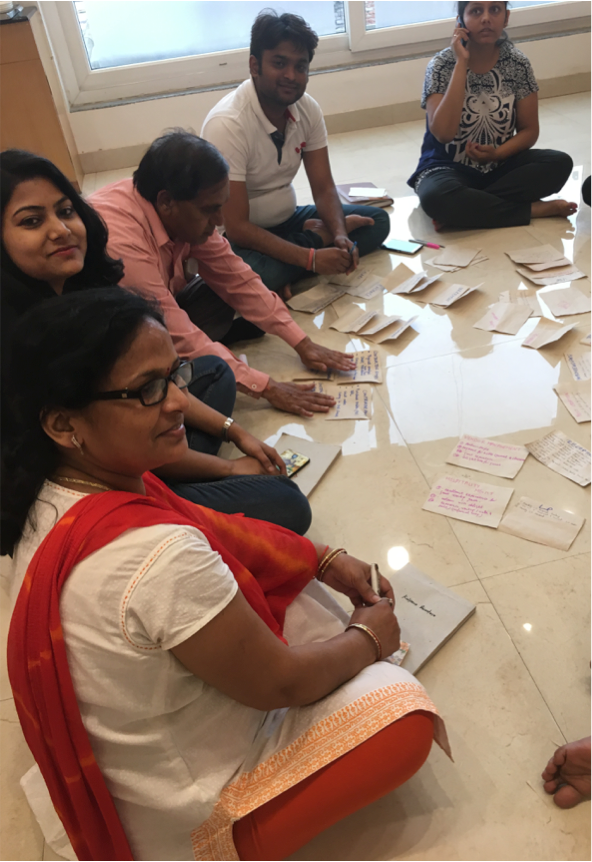
This is self-management in practical, tangible terms.
Yash Papers has stopped dreaming about self-management and started doing it, with a non-hierarchical HR team, and self-initiated Working Groups — but not without the vision of an even bigger dream, the #BFWPIN dream.
I reflected to Ved that I personally had shifted from a 5-year commitment to a 20-year commitment to #BFWPIN.
There are many more elements to the plan — doubling the size of the on-site residential colony — re-imagining the working buildings as tools to facilitate collaboration, becoming 100% closed loop regenerative system, creating a learning community for all generations on campus. Do you have skills in any of these areas?
This work cannot be scaled from a framework. This work is intimate and relational and emergent and instinctive. This work can only be done by individuals who are deliberate in their own personal development practice.
If the long, often difficult work of commitment and intention, whether on this project or more generally, is what you recognise as your path, let’s amplify each other.
* #BFWPIN = Best Fricken Workplace in India
Republished with permission of the author. Part 1 of this article was also republished by EE Magazine.
Featured Image/graphic link added by Enlivening Edge Magazine
